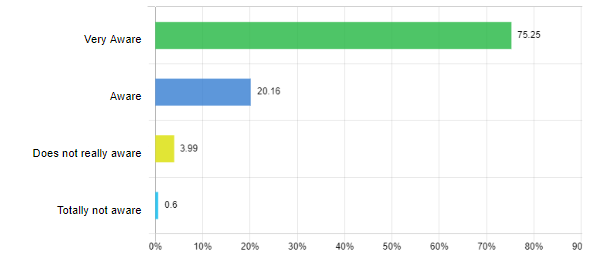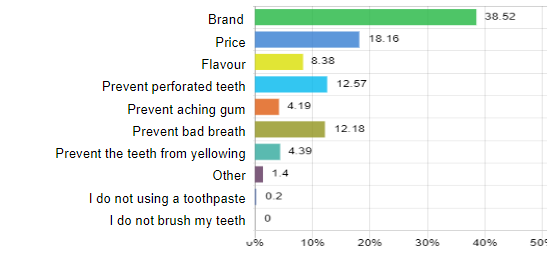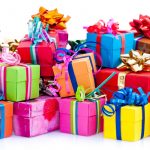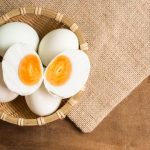Oral health is essential to overall health. Good oral health improves a person’s ability to speak, smile, smell, taste, touch, chew, swallow, and make facial expressions to show feelings and emotions. Clinical studies have shown that those with poor oral hygiene are at increased risk of developing various oral health problems. Poor oral hygiene is directly responsible for an increased incidence of dental caries, periodontal disease, halitosis, oral pain, and discomfort for denture wearers.
But, do Indonesians already have an awareness of the importance of maintaining good health? What has been done every day to maintain oral health?
Let’s find out about Indonesian preferences in oral health.
This result is from a survey done by Licorice.
PERIOD: 2017/8/28 〜 2017/12/31
RESPONDENTS: 501 Indonesians
Q: Do you realize the importance of your oral health? (SA)

Based on Licorice’s survey, about 75.25 percent of Indonesian, claimed very aware of oral health. Indonesian Dental and Mouth Therapist Association (PTGMI) shows the opposite data. For example, in Aceh, one of the provinces in Indonesia, around 70 to 80 percent of people having a toothache and only 10 percent who went to see a dentist. It proves that the level of awareness amongst Indonesian for taking care of their oral health is poor.
Q: What is causing your mouth or teeth problems? (SA)

Licorice’s survey shown 58.28 percent of respondents have a tooth cavity. According to the Mayo Clinic, cavities and tooth decay are some of the most common health problems in the world, including Indonesia. Anyone with teeth can develop cavities, including babies. Cavities are generally preceded by plaque in the mouth. Plaque comes from leftovers that contain sugar, such as bread, cereals, milk, soft drinks, fruit, cakes, or sweets, where this type of food is liked by most Indonesian people.
Basic Health Research in 2018 shows that 88.8% of Indonesian people have cavities, and this problem is also experienced by 92.6 percent of Indonesian children aged 5 years. For children, pain because of having tooth cavities affects lower productivity in school, minimizing the capacity to take lessons and loss of appetite which can affect the incomplete nutrition of children’s growth.
Another oral health problem that is often experienced by Indonesian people is having sensitive teeth. According to the survey above, about 34.13 percent have sensitive teeth. While 21.16 percent have dirty or yellowed teeth.
Q: What tools do you use to maintain your oral health? (SA)

If seen from the results of the licorice survey above, most Indonesian people only have a toothbrush and toothpaste as a tool to clean the mouth organ. While mouth wash is only owned by 27.94 percent and other tools such as floss cleaning between teeth or tongue brush only have less than 10 percent.
The reason why most Indonesian only have a toothbrush and toothpaste that’s because awareness of maintaining oral health is poor, which automatically knowledge about the importance of having other oral health tools besides toothbrushes and toothpaste is also lacking. Also, they felt that cleaning the mouth was only enough with the toothbrush and toothpaste.
Even though, according to the American Dental Association (ADA) Seal of Acceptance, there are seven important tools for daily oral hygiene such as toothbrushes, toothpaste, dental floss, dental picks and sticks, mouthwashes, oral irrigators (especially when you wear braces or have a fixed partial denture), and tongue scrapers.
Q: What are your considerations when choosing toothpaste? (SA)

Based on Licorice’s survey, about 38.52 percent, consider the brand when choosing a toothpaste, especially if the brand is widely used by many people. Most customers prefer buying products from a brand they are familiar with. This is because they seek a certain amount of trust while making their purchases. They believe that trustworthy sellers are capable of offering more value with every purchase. So that the remaining money can still be allocated to others’ needs.
Moreover, because Indonesian has a problem with perforated teeth, 12.57 percent looking for a toothpaste that contains fluoride, which is believed to help prevent cavities.
In Indonesian, there are at least two toothpaste brands that could easily found almost in every market. First, Pepsodent by Unilever. That brand most often used by Indonesian because it has become a mainstay brand to prevent and repair cavities. The second well-known toothpaste is CloseUp. This brand has known to prevent bad breath.
For conclusion
The level of awareness amongst Indonesian for taking care of their oral health is really poor. Tooth cavities and sensitive teeth are the two biggest threats to oral health and are among the most common chronic diseases in Indonesia. But, to maintain oral health, mostly they only have and use toothbrush and toothpaste. Their main considered factors when buying toothpaste are the brand, the price, and can prevent tooth cavities.

















No comments yet.